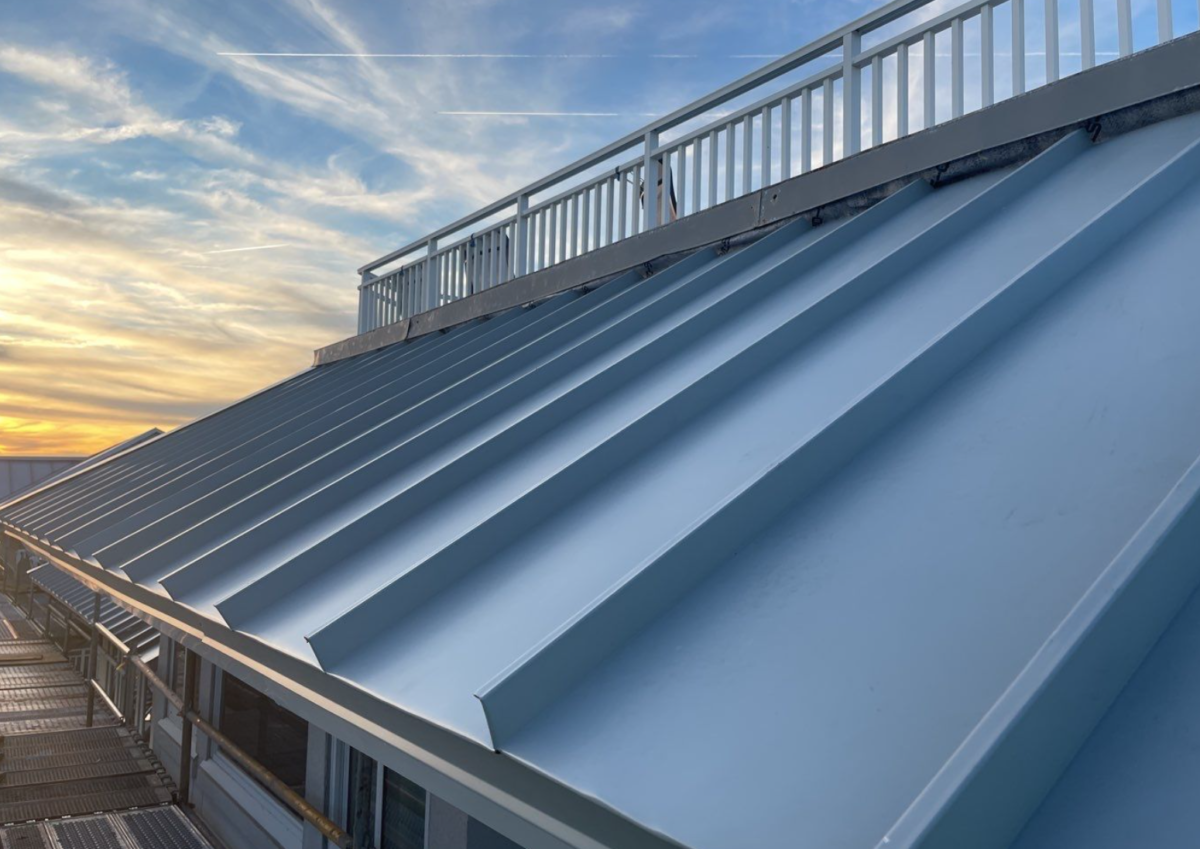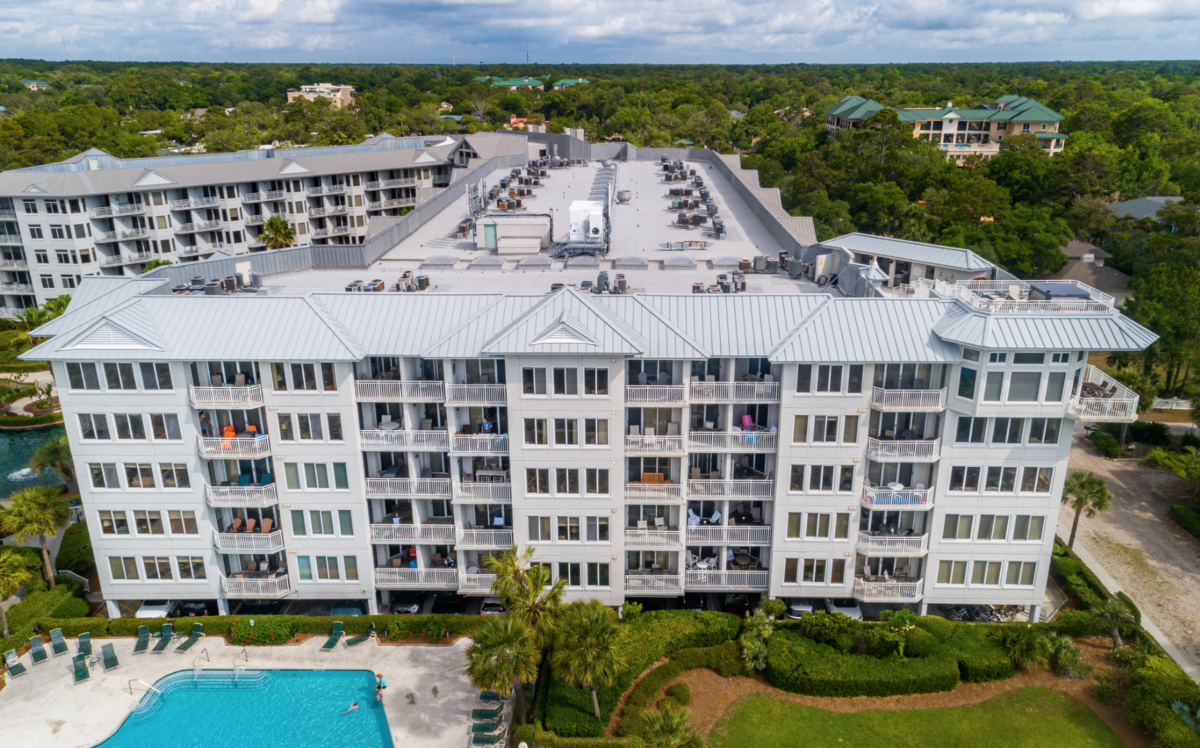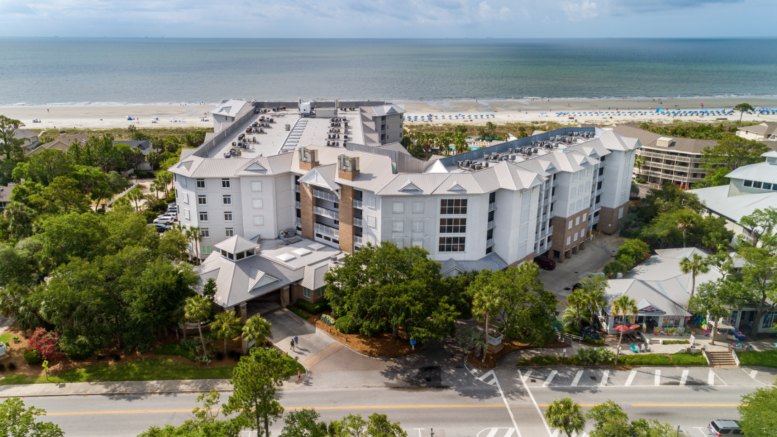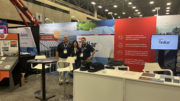After 20 years right next to the Atlantic Ocean in Hilton Head, South Carolina, the metal roof on the Sea Crest Condos had taken a beating. After decades in the harsh, corrosive seaside environment, the existing painted standing seam metal roof on the six-story building was severely corroded, along with much of the steel truss framing. The owners had no choice but to explore a roof replacement.
The consultant on the project, Dee Dee Graham of Engineered Systems, Hilton Head Island, proposed an aluminum standing seam metal roof with a three-coat paint system, and he invited contractors to bid on the project. Roofing Professionals Inc. (RPI) was awarded the job. When Ted Deaton, RPI’s vice president, approached his suppliers about the project, they recommended what they felt was a better solution: installing aluminum panels with DuPont Tedlar PVF film, a product specifically designed to withstand harsh environments.
Finding the Right Roof System
RPI has been in business for 22 years and has offices in Richmond Hill and Augusta, Georgia, and Columbia, South Carolina. The full-service roofing contractor primarily focuses on commercial, industrial, and educational projects. A lot of the company’s work is done near the ocean, and they’ve seen the damage the salt air can do.

RPI was tasked with demolishing the existing 20-year-old steel standing seam roof, repairing the steel framing, and installing a new standing seam metal roof. The project specified installation of a new aluminum standing seam roof system from Construction Metal Products, Inc.
Construction Metal Products (CMP) has been in business for 28 years and is a full-line manufacturer of metal roofing and trim products, with multiple locations throughout the Carolinas and Virginia, including its home office in Statesville, North Carolina. CMP’s president, Mike Noble, had recently met with Metal Alliance, and the company had partnered with them to offer Tedlar finish on aluminum and galvalume.
“Metal Alliance has the exclusive with DuPont on the Tedlar line,” notes Noble. “Tedlar is essentially a very thin PVF film that has a color. They put it through a process that permanently bonds it to the metal.”
The product is backed by a long-term warranty. “What really makes Tedlar attractive, especially for this type of application, is that the Tedlar warranty does not have the typical exclusions you see with other products in a coastal environment,” Noble points out. “Tedlar offers up to a 40-year warranty in that situation, and up to a 50-year warranty in a wall application.”
Noble points out that while Tedlar is relatively new to the roofing market in the United States, it has a proven track record in building and construction in many other countries, and is globally proven in other applications. “Once we learned about it, we realized Tedlar has been around for a long time,” Noble says. “It’s just now, in the past few years, that DuPont has been looking at it for metal roofing at the U.S. coastline. It’s been used in other building applications for 50-plus years, and in many additional industries, including aviation, solar panels, and signage.”
When RPI approached him about the Sea Crest Condo project, Noble knew what to recommend. “We realized that this would be the perfect application for the product, given how corrosive the environment was, and we recommended Tedlar to RPI.”

Deaton relayed the recommendation to the owner and consultant, and they gave it the green light. “Because of the harsh, corrosive environment of the oceanfront property, the combination of aluminum base metal and Tedlar film provided the best value available to the owner for long-term performance,” says Deaton. “The consultant and owner accepted the Tedlar option because there would be less required maintenance and maintenance documentation to maintain the finish warranty. They also liked the proven abrasion resistance and durability, as well as the dirt shedding and stain resistance of the Tedlar film technology. It also resists fading and will provide a consistent color aesthetic to the building for many years.”
The project was one of the first Tedlar roofing installations in the country and marked the first time RPI had worked with the product.
Getting it All Ready
CMP manufactured the 18-inch-wide CMP Series 2500 panels from .040 aluminum base metal supplied by Metal Alliance in Tedlar Granite Gray Color. Panels were fabricated to meet RPI’s field measurements and delivered to the site.
“RPI came up with a roof panel and trim list that they submit to us for manufacturing,” says Noble. “We have our own fleet of tractors with 48- and 53-foot trailers, and we took it straight to the jobsite down in Hilton Head.”
The jobsite access was tight, but fortunately an adjacent low-slope roof could be used as a staging area for both demolition and reroofing. “This building is right on the ocean,” Deaton says. “There is only a swimming pool and landscaping between this building and the dunes. There was no access at all, so we set up a six-story scaffold system for access as well as safety. We set up a platform at the eave to work off of to begin demolition.”
Maintaining a safe jobsite and minimizing the disruption to the people occupying the building were critical. “As part of RPI’s safety protocol, each crew starts each day with a Jobsite Hazard and Safety Analysis. The work of the day is planned and potential safety hazards are discussed,” Deaton says. “There was only one access point for crane setup. Because of the ability to stockpile the demolition and the new products on the adjacent low-slope modified bitumen roof, crane usage and owner disruption was minimized.”
The concrete roof deck had been topped with trusses to frame the original mansard roof. RPI’s crews had to work section by section to ensure the occupied structure was watertight at the end of each day. “The challenge was to tear off the old panels and put up the new panels to ensure the weathertightness of the roof system,” Deaton says.
Demo and Installation
As work began in each section, the old panels were removed, the framing replaced as necessary, and new panels and trim were installed. “The existing roof was a painted steel nail strip panel over hat channels,” Deaton says. “We basically backed the fasteners out of the panel, pulled the panel off, took it over the shed onto the flat roof, and brought up the new panels to install.”
In many areas, structural work had to be completed before the new panels could be installed. “The specified scope of work and good roofing practice dictated that we replace rotten wood fascia and corroded hat channel,” Deaton says. “We also painted of the remaining hat channel with rust inhibitive paint, and installed new valley, hip and ridge support framing.”
New panels were affixed to the hat channels with stainless steel clips and stainless steel fasteners provided by Triangle Fastener Corporation. The panels were mechanically seamed. Unforeseen challenges included repairing flashing and louvers. “One issue that was discovered during the demolition was the improper flashing and the corrosion of the truss cavity louvers,” Deaton says. “RPI removed the louvers, sand blasted, repainted, properly flashed the louver openings and replaced the louvers.”
It was the RPI’s first experience installing Tedlar panels, but there were no real differences in working with the product, according to Deaton. “One thing our field personnel let us know was that the durability of the Tedlar film seemed to be better,” he says. “It was more resistant to scratches and abrasions than a painted finish.”
Work took place over the winter, and weather conditions posed some challenges. “We were right on the ocean, six stories up, and the wind blows pretty hard all the time,” Deaton says. “It doesn’t get terribly cold here, but with the humidity, it’s pretty bone-chilling. Our team battled typical winter weather, strong ocean winds, and working off a six-story scaffold with minimal access to the work area while being minimally invasive to the resident’s daily activities.”
A Beautiful Result
The roof was completed in February of 2022, and feedback has been overwhelmingly positive, according to Deaton. “In fact, the owners plan to install it on the rest of the complex,” he says. “They were very pleased with the outcome — it looks great, and they were pleased with RPI’s installation process. It was a large-scale project, and we invaded their space as little as possible.”
Deaton andNoble see a bright future ahead for metal roofing featuring Tedlar PVF film. “We have about 15-20 projects quoted right now,” Noble says.
Noble points to key benefits of Tedlar including its durability, aesthetics, and a robust warranty. “It’s up to a 40-year roof and 50-year wall warranty with basically no coastal exclusions,” Noble says. “It’s available in eight colors. Tedlar has been time tested through other applications, and there is little to no fading or chalking with this product.”
RPI was proud to be part of the project, notes Deaton. “Twenty-two years of experience gives our team the ability to analyze, educate, and execute most any roofing project safely,” Deaton says. “RPI is the trusted and preferred roofing contractor in the markets we serve. Our logo is a blue triangle, and our tagline is ‘Trust the Triangle!’ Because of our vendor relationship, experience, and reputation, CMP and Metal Alliance trusted our company to complete one of the first installations of the innovative Tedlar product in North America.”
TEAM
Consultant: Engineered Systems, Hilton Head Island, South Carolina, engineeredsystems.com
Roofing Contractor: Roofing Professionals, Inc. (RPI), Richmond Hill, Georgia, rpiroof.com
Panel Supplier: Construction Metal Products, Inc., Statesville, North Carolina, cmpmetalsystems.com
Metal Supplier: Metal Alliance, Palm City, Florida, www.metalalliance.com
MATERIALS
Metal Panels: CMP Series 2500 panels, Construction Metal Products, Inc., cmpmetalsystems.com
Metal Finish: Tedlar PVF film, DuPont, dupont.com
Fasteners: Triangle Fastener Corporation, trianglefastener.com





Be the first to comment on "Hilton Head Metal Roof Designed to Stand Up to Corrosive Environments"